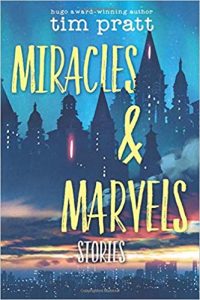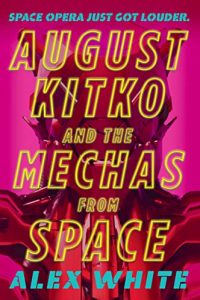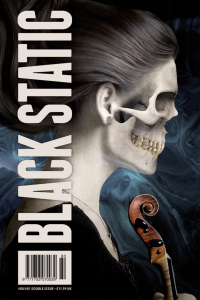Niall Harrison Reviews Miracles & Marvels: Stories by Tim Pratt
 Miracles & Marvels: Stories, Tim Pratt (The Merry Blacksmith Press, 978-1-69571-634-6, $14.95, 289pp, pb) November 2019.
Miracles & Marvels: Stories, Tim Pratt (The Merry Blacksmith Press, 978-1-69571-634-6, $14.95, 289pp, pb) November 2019.
Patreon fiction is the dark matter of our field: it’s hard to tell how much there is, and how substantial it is. Many writers have established Patreons, and many of them offer regular original stories to their supporters; and since that counts as first publication, many or most of those stories never make it out into the baryonic world. You can be reasonably confident that if a writer has enough support to make a Patreon viable, they have enough skill to be worth investigating.
So Tim Pratt’s Miracles & Marvels, although a little uneven, is welcome on that front alone. Of its 17 stories, written between 2013 and this year, fully two-thirds originated with his Patreon, including several of the strongest – in fact, for my money, the average quality of the Patreon stories is higher than those solicited for anthologies.
Perhaps this is because, as Pratt notes in his introduction, Patreon offers the freedom “to experiment, try out different narrative approaches, be ambitious, and enjoy myself.” Pratt is always a good craftsman, but the Patreon stories by definition don’t have to wrestle with the constraints of an existing universe (as the Sherlockian spin-off “Heavy Game of the Pacific Northwest” unevenly does), nor are they tortured by theme (as is the laborious “Murmured Under the Moon”, in which a fairy guide who really shouldn’t be a reliable interlocutor is saddled with far too much authoritative exposition). The best of the anthology stories is probably “Those Who Hunt Monsters” – also one of the darkest tales – in which a nukekubi, a Japanese humaniform monster whose head can detach from its body and fly around independently, relates her vengeance on the nerdbro who killed her sister because he didn’t see her humanity. The direction of travel is obvious from early on, but it’s still cathartic.
The bum notes are made more obvious because Miracles & Marvels is itself quite carefully organised. There’s an unofficial trilogy of fairy stories, a trilogy of monsters, a trilogy of adventurous apprentices, and so on. In the first category, for instance, “Murmured Under the Moon” is in the shadow of the effortlessly charming “Not a Miracle but a Marvel”. A polyamorous foursome who pride themselves on “minimal poly drama” visit a cabin in the woods, and when one of them stumbles into the fairy realm, the other three are all able to gamble their love for his rescue. It’s a low-stress tale, filled with warmth.
The monsters trilogy, meanwhile, includes perhaps my favourite piece in the collection: “Sometimes You Get the Bear”, a brilliant Anthropocene fantasy. “The bear appears for everyone at the moment of death,” the narrator tells us, “and rises up, and roars, and takes its swipe, and its bite, and then shambles away, vanishing soon after.” In hospitals, deathbeds come with a yellow safety perimeter, to warn potential bystanders. Witnessing the bear is traumatic enough that the narrator accepts an invitation to track the bear to its lair, in an attempt to end death. It is a horrifying failure: the bear is shot dead, but thereafter, it is the hunter who appears at deathbeds, and shoots the dying in the head, and smiles. Where things go from there shouldn’t be spoiled, but there is a possibility of light to balance the dark.
Two other stories in a similar magic-realist vein, at either end of the collection, have also stayed with me. In “The Wilderness Within”, a woman wakes up to discover there’s a new volcano in her city that only she can see. It turns out that it accompanies a man, and travels with him wherever he goes. Notwithstanding this great big warning sign, the woman sleeps with the man, after which things go badly, and as a kicker, she gains her own externalised psychological landscape as a result. As with some of the other stories, the point is a bit on-the-nose, but it’s so unusual that it remains effective. Something similar could be said of “The Zipper”, an original story that closes the collection. Here, after a bad sunburn, a man discovers a zipper in his chest, and when he unzips, something takes over, and he loses consciousness and hours of time. The metaphor is coming out, of course, but it’s affecting a character who seems to already be comfortably out in every aspect of his poly, kinky life: the conclusion, perhaps, is that there’s always more to unpack, if you’re with the right people.
The happy strangeness at the end of “The Zipper” is typical for Pratt. Obviously some exceptions are discussed above, but most of the stories in Miracles & Marvels involve decent people and have upbeat endings. There may even come a point – for me it was in the perfectly enjoyable “Anna and Marisol in Time and Space”, in which time-travelling lesbians fight terrorism and fears of commitment – when the coziness defuses any sense of tension. I was left feeling that a book which was 20 percent shorter would also have been 20 percent stronger; but of course there’s no reason one has to read a collection straight through. And if it had been shortened, I wouldn’t know as much about this particular patch of dark matter.
This review and more like it in the November 2019 issue of Locus.
 While you are here, please take a moment to support Locus with a one-time or recurring donation. We rely on reader donations to keep the magazine and site going, and would like to keep the site paywall free, but WE NEED YOUR FINANCIAL SUPPORT to continue quality coverage of the science fiction and fantasy field.
While you are here, please take a moment to support Locus with a one-time or recurring donation. We rely on reader donations to keep the magazine and site going, and would like to keep the site paywall free, but WE NEED YOUR FINANCIAL SUPPORT to continue quality coverage of the science fiction and fantasy field.







